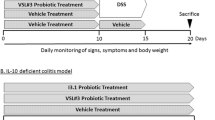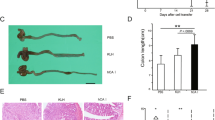Abstract
Curcumin is a tumeric-derived, water-insoluble polyphenol with potential beneficial health effects for humans. It has been shown to have preventive as well as therapeutic effects in chemically induced murine models of colitis. To investigate whether curcumin exerts a similar effect on the spontaneous colitis in interleukin (IL)-10 gene-deficient mice, we gavaged these mice daily for 2 weeks with 200 mg/kg per day curcumin emulsified in carboxymethyl cellulose, a food additive generally used as a viscosity modifier. Mice fed the curcumin/carboxymethyl cellulose mixture and those receiving carboxymethyl cellulose alone demonstrated similar reductions in histological injury score and colon weight/length ratio compared to water-fed controls. However, significant reductions in pro-inflammatory cytokine release in intestinal explant cultures were only seen in mice treated with the curcumin mixture. Our data demonstrate that in IL-10 gene-deficient mice, both oral curcumin and carboxymethyl cellulose, appear to have modifying effects on colitis. However, curcumin has additional anti-inflammatory effects mediated through a reduced production of potent pro-inflammatory mucosal cytokines.




Similar content being viewed by others
References
Calabrese V, Butterfield DA, Stella AM. Nutritional antioxidants and the heme oxygenase pathway of stress tolerance: novel targets for neuroprotection in Alzheimer’s disease. Ital J Biochem. 2003;52:177–181.
Jain SK. Ethnobotany and research on medicinal plants in India. Ciba Found Symp. 1994;185:153–164. discussion 164–168.
Huang TS, Lee SC, Lin JK. Suppression of c-Jun/AP-1 activation by an inhibitor of tumor promotion in mouse fibroblast cells. Proc Natl Acad Sci USA. 1991;88:5292–5296. doi:10.1073/pnas.88.12.5292.
Jiang MC, Yang-Yen HF, Yen JJ, Lin JK. Curcumin induces apoptosis in immortalized NIH 3T3 and malignant cancer cell lines. Nutr Cancer. 1996;26:111–120.
Joe B, Rao UJ, Lokesh BR. Presence of an acidic glycoprotein in the serum of arthritic rats: modulation by capsaicin and curcumin. Mol Cell Biochem. 1997;169:125–134. doi:10.1023/A:1006877928703.
Ruby AJ, Kuttan G, Babu KD, Rajasekharan KN, Kuttan R. Anti-tumour and antioxidant activity of natural curcuminoids. Cancer Lett. 1995;94:79–83. doi:10.1016/0304-3835(95)03827-J.
Singh AK, Sidhu GS, Deepa T, Maheshwari RK. Curcumin inhibits the proliferation and cell cycle progression of human umbilical vein endothelial cell. Cancer Lett. 1996;107:109–115. doi:10.1016/0304-3835(96)04357-1.
Camacho-Barquero L, Villegas I, Sanchez-Calvo JM, et al. Curcumin, a Curcuma longa constituent, acts on MAPK p38 pathway modulating COX-2 and iNOS expression in chronic experimental colitis. Int Immunopharmacol. 2007;7:333–342. doi:10.1016/j.intimp.2006.11.006.
Jiang H, Deng CS, Zhang M, Xia J. Curcumin-attenuated trinitrobenzene sulphonic acid induces chronic colitis by inhibiting expression of cyclooxygenase-2. World J Gastroenterol. 2006;12:3848–3853.
Salh B, Assi K, Templeman V, et al. Curcumin attenuates DNB-induced murine colitis. Am J Physiol Gastrointest Liver Physiol. 2003;285:G235–G243.
Sugimoto K, Hanai H, Tozawa K, et al. Curcumin prevents and ameliorates trinitrobenzene sulfonic acid-induced colitis in mice. Gastroenterology. 2002;123:1912–1922. doi:10.1053/gast.2002.37050.
Jobin C, Bradham CA, Russo MP, et al. Curcumin blocks cytokine-mediated NF-kappa B activation and proinflammatory gene expression by inhibiting inhibitory factor I-kappa B kinase activity. J Immunol. 1999;163:3474–3483.
Jian YT, Mai GF, Wang JD, Zhang YL, Luo RC, Fang YX. Preventive and therapeutic effects of NF-kappaB inhibitor curcumin in rats colitis induced by trinitrobenzene sulfonic acid. World J Gastroenterol. 2005;11:1747–1752.
Arafa HM, Hemeida RA. El-Bahrawy AI, Hamada FM. Prophylactic role of curcumin in dextran sulfate sodium (DSS)-induced ulcerative colitis murine model. Food Chem Toxicol 7(6). 2009;1311–1317.
Ukil A, Maity S, Karmakar S, Datta N, Vedasiromoni JR, Das PK. Curcumin, the major component of food flavour turmeric, reduces mucosal injury in trinitrobenzene sulphonic acid-induced colitis. Br J Pharmacol. 2003;139:209–218. doi:10.1038/sj.bjp.0705241.
Deguchi Y, Andoh A, Inatomi O, et al. Curcumin prevents the development of dextran sulfate Sodium (DSS)-induced experimental colitis. Dig Dis Sci. 2007;52:2993–2998. doi:10.1007/s10620-006-9138-9.
Yomogida S, Kojima Y, Tsutsumi-Ishii Y, Hua J, Sakamoto K, Nagaoka I. Glucosamine, a naturally occurring amino monosaccharide, suppresses dextran sulfate sodium-induced colitis in rats. Int J Mol Med. 2008;22:317–323.
Saverymuttu SH, Camilleri M, Rees H, Lavender JP, Hodgson HJ, Chadwick VS. Indium 111-granulocyte scanning in the assessment of disease extent and disease activity in inflammatory bowel disease. A comparison with colonoscopy, histology, and fecal indium 111-granulocyte excretion. Gastroenterology. 1986;90:1121–1128.
Sydora BC, Tavernini MM, Doyle JS, Fedorak RN. Association with selected bacteria does not cause enterocolitis in IL-10 gene-deficient mice despite a systemic immune response. Dig Dis Sci. 2005;50:905–913. doi:10.1007/s10620-005-2663-0.
Sydora BC, Tavernini MM, Wessler A, Jewell LD, Fedorak RN. Lack of interleukin-10 leads to intestinal inflammation, independent of the time at which luminal microbial colonization occurs. Inflamm Bowel Dis. 2003;9:87–97. doi:10.1097/00054725-200303000-00002.
Strober W, Kelsall B, Fuss I, et al. Reciprocal IFN-gamma and TGF-beta responses regulate the occurrence of mucosal inflammation. Immunol Today. 1997;18:61–64. doi:10.1016/S0167-5699(97)01000-1.
Abraham C, Cho J. Interleukin-23/Th17 pathways and inflammatory bowel disease. Inflamm Bowel Dis. 2009.
Billerey-Larmonier C, Uno JK, Larmonier N, et al. Protective effects of dietary curcumin in mouse model of chemically induced colitis are strain dependent. Inflamm Bowel Dis. 2008;14:780–793. doi:10.1002/ibd.20348.
Swidsinski A, Sydora BC, Doerffel Y, et al. Viscosity gradient within the mucus layer determines the mucosal barrier function and the spatial organization of the intestinal microbiota. Inflamm Bowel Dis. 2007;13:963–970. doi:10.1002/ibd.20163.
Larmonier CB, Uno JK, Lee KM, et al. Limited effects of dietary curcumin on Th-1 driven colitis in IL-10 deficient mice suggest an IL-10-dependent mechanism of protection. Am J Physiol Gastrointest Liver Physiol. 2008;295:G1079–G1091. doi:10.1152/ajpgi.90365.2008.
Acknowledgments
This work was supported by a grant from the Crohn’s and Colitis Foundation of Canada.
Author information
Authors and Affiliations
Corresponding author
Additional information
Dr. Sydora and Dr. Fedorak share senior authorship.
Rights and permissions
About this article
Cite this article
Ung, V.Y.L., Foshaug, R.R., MacFarlane, S.M. et al. Oral Administration of Curcumin Emulsified in Carboxymethyl Cellulose Has a Potent Anti-inflammatory Effect in the IL-10 Gene-Deficient Mouse Model of IBD. Dig Dis Sci 55, 1272–1277 (2010). https://doi.org/10.1007/s10620-009-0843-z
Received:
Accepted:
Published:
Issue Date:
DOI: https://doi.org/10.1007/s10620-009-0843-z




